It was a unanimous Supreme Court that in early September ruled that it is against Mexico's constitution to criminalize abortion.
The decision was directed at a law in one of Mexico's states that made abortion a criminal act, but the court's assessment is now expected to be prejudicial to the entire country.
To date, only four states have allowed abortion in almost all circumstances.
"We can have a breakthrough"
Human rights organizations in the country have celebrated, while pro-life activists have organized to demonstrate against the message.
Omar de la Rosa is one of those involved in the anti-abortion movement in Mexico.
- I think we can continue to work and get a breakthrough that protects life from conception, he says to the Foreign Office.
According to de la Rosa, it is a minority of the population the Supreme Court has now met.
- Many laws have been changed by minorities who have presented it as if they are in the majority.
But it is good that such movements exist, it helps us to mobilize.
We are with the majority who defend life and we are with the most defenseless.
Strict laws
According to a UN report, half a million illegal abortions are performed in Mexico each year.
More than 2,000 women die as a result of unsafe procedures.
Last year, Argentina became the fourth country in Latin America to allow abortions after Uruguay, Guyana and French Guiana.
In Central America, Belize, Cuba and Puerto Rico also have permissive abortion laws.
Most other Latin American countries allow abortion if the woman's life is in danger, but there are also countries where all abortions are completely banned.
In El Salvador, a woman can be sentenced to up to 50 years in prison for abortion.
Click on the video to hear Omar de la Rosa talk about his abortion resistance. And see more in the Foreign Office: Yes to life! on SVT Play from 7.30 pm and on SVT2 at 9.45 pm tonight.

